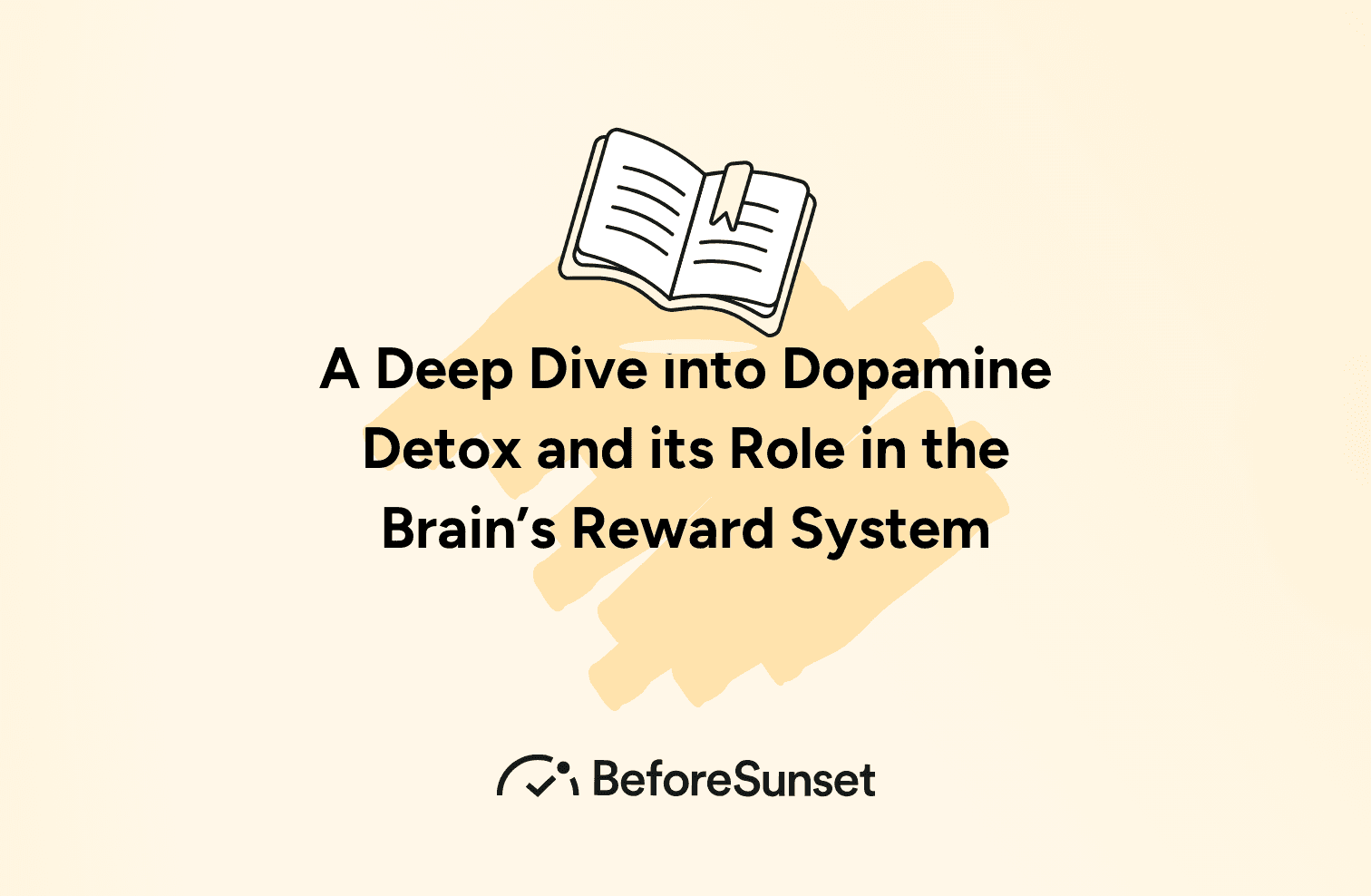Our brain is a complex network of compounds and neurotransmitters that control various functions, including our emotions, motivation, and pleasure.
Among these neurotransmitters, dopamine is crucial to the brain’s reward system. This article will explore the intriguing world of dopamine, including its functions, effects, and significance in the context of a dopamine detox.
You might also like:
11 Morning Routine Checklist: How to Make the Most of Your Time
Why Are You So Tired After Work? 7 Reasons and Ways to Fix It
7 Signs You're Mentally Drained: And the Way to Get Rid of It
Understanding Dopamine
Dopamine is a neurotransmitter, which is a chemical messenger that transmits signals between nerve cells in the brain. It is commonly known as the “feel-good” neurotransmitter because it plays a vital role in the experience of pleasure and reward.
Turn Your To Do’s Into Dones
Dopamine participates in numerous physiological and psychological processes, including motivation, learning, movement, and mood regulation.
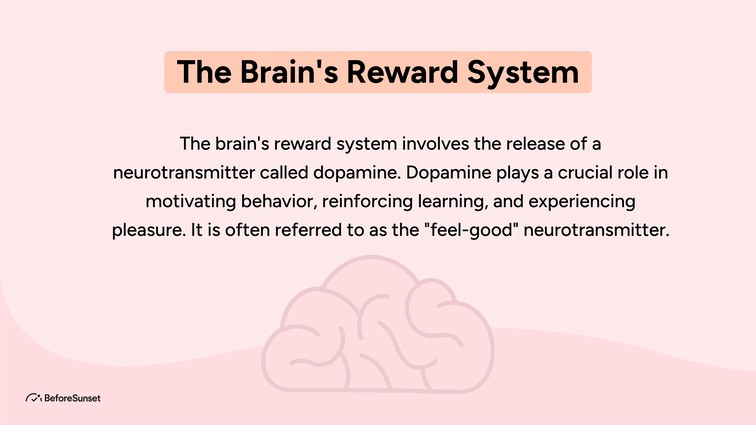
The Brain's Reward System
To fathom the significance of dopamine, we must first comprehend the brain’s reward system.
This complex network of neural pathways and structures, centered predominantly on the mesolimbic pathway, is responsible for reinforcing survival and well-being-promoting behaviors.
It functions as a motivational system, providing a sense of pleasure and fulfillment when we engage in activities that satisfy our requirements.
Dopamine’s Role in the Reward System
Dopamine is a crucial component of the brain’s reward system. Dopamine is released in specific brain regions, including the nucleus accumbens, in response to engaging in pleasurable or pleasurable activities, such as eating delicious cuisine, exercising, or accomplishing a goal.
This dopamine release induces a feeling of pleasure and reinforces the behavior, making us more likely to seek out comparable experiences in the future.
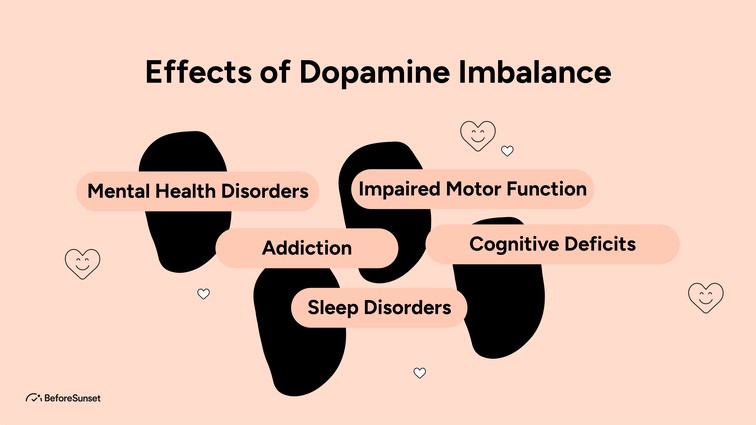
Effects of Dopamine Imbalance
Dopamine is necessary for motivation and reward, but an imbalance or dysregulation of dopamine can result in various problems.
For instance, excessive pleasurable activity has been associated with addiction, as individuals can develop a dependence on substances or behaviors that overstimulate dopamine receptors.
On the other hand, low dopamine levels have been linked to conditions such as despondency and apathy.
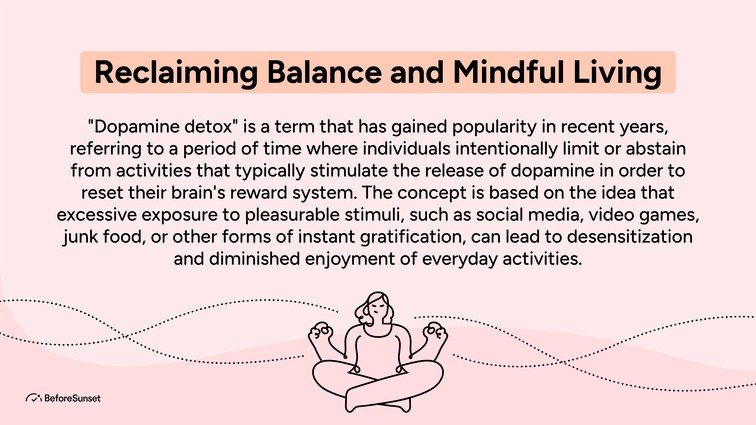
Exploring the Concept and Purpose of Dopamine Detox: Reclaiming Balance and Mindful Living
In our modern, hyperstimulated world, our brains are perpetually bombarded with external stimuli that trigger the release of dopamine, the neurotransmitter responsible for feelings of pleasure.
However, excessive dopamine stimulation can result in behavioral addiction, impaired concentration, and a lack of satisfaction.
Dopamine detox is gaining popularity due to its ability to restore balance and promote mindful living.
BeforeSunset AI syncs your calendar and to-do list for a mindful productivity routine. It effortlessly optimizes your schedule with time-blocking and task organization. Say goodbye to scattered to-do lists and hello to a streamlined day with an AI planner.
Dopamine Detox: Everything You Need to Know
A dopamine detox, also known as a dopamine fast, entails abstaining from activities that overstimulate our dopamine receptors for a predetermined period of time. The objective is to decrease our reliance on external sources of delight and restore our sensitivity to natural rewards.
By temporarily disconnecting from addictive behaviors and distractions, our brain's reward system can be recalibrated, resulting in improved well-being and a renewed sense of control.
The Purpose of Dopamine Detox:
Restoring Sensitivity: Constant exposure to highly stimulating activities such as social media, video games, and excessive screen time can dull our dopamine receptors' sensitivity. A dopamine detox enables us to break free of these overstimulating patterns and restore a healthy sensitivity to the pleasures of daily life.
Breaking Addictive Cycles: Many activities that trigger dopamine release can become addictive, leading to compulsive behavior and a reduced ability to derive pleasure from other sources. By temporarily abstaining from these activities, we can break free from addictive cycles and regain control over our actions and choices.
Cultivating Mindfulness: Dopamine detox affords the opportunity to cultivate mindfulness and be completely present in the present moment. By disconnecting from external distractions, we can increase our awareness, reconnect with our internal experiences, and cultivate a greater appreciation for the basic pleasures that surround us.
Reevaluating Priorities: The fast-paced nature of modern existence frequently causes us to lose sight of what truly matters. A dopamine detox provides an opportunity to pause, reflect, and reevaluate our values and priorities. By distancing ourselves from the constant pursuit of external validation and immediate gratification, we can better align our actions with our genuine desires and long-term objectives.
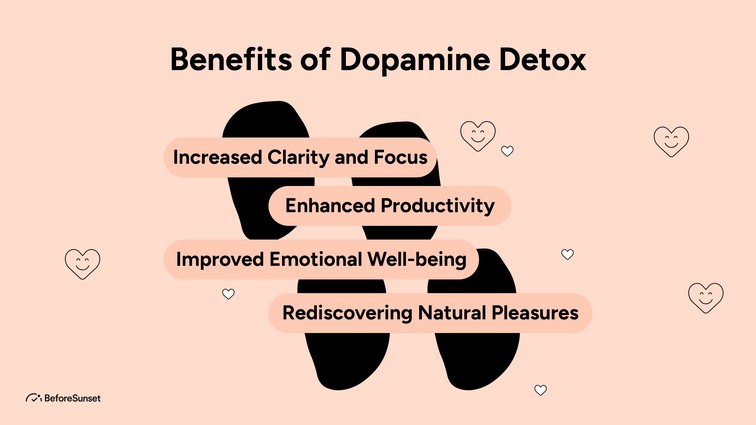
Benefits of Dopamine Detox for a Healthier Life:
Increased Clarity and Focus: Detoxing from dopamine-triggering activities can sharpen our mental focus, eliminate brain fog, and boost our capacity to concentrate on crucial tasks.
Enhanced Productivity: We may recapture vital time and energy by removing distractions and diverting them to meaningful and productive tasks. This renewed focus can lead to increased productivity and a sense of success.
Improved Emotional Well-being: Dopamine detox promotes a more positive relationship with pleasure and rewards. We may notice reduced anxiety, restlessness, and mood swings as we re-calibrate our reward system, creating a more stable and balanced emotional state.
Rediscovering Natural Pleasures: We grow more attuned to the simple joys of life by detaching from artificial stimuli, such as spending time in nature, engaging in creative endeavors, cultivating relationships, or savoring a wonderful meal. Dopamine detox can help us rediscover our appreciation for these natural sources of pleasure.
How to Incorporate Dopamine Detox into Your Life
Dopamine detoxification is a life-altering activity, especially in today's society of continual stimulation and rapid satisfaction.
By avoiding things that overstimulate your dopamine receptors, you can improve your focus, get more done, and develop a more balanced outlook on pleasure.
Step-by-step instructions on implementing dopamine detox into your life to restore equilibrium and cultivate mindful living are provided in the following:
Reflect and Set Intentions: Think about the ways in which you are now using dopamine stimulation too much. Consider the effects of things you often do, such as checking social media, watching television, or eating sweets, on your health and productivity. Think carefully about why you want to perform a dopamine detox and what you hope to accomplish.
Plan Your Detox Period: Choose how long your dopamine detox lasts. Periods might range from a couple of hours to a day, weekend, or week. Choose a time frame that works for you and is practical. Think about when you will have the least distractions and the most time to devote to the detox.
Communicate and Seek Support: Tell your friends, relatives, or close family members of your choice to undergo a dopamine detox. Explain why you're doing it and ask for their understanding and support through this difficult time. Having a support system might help you stay dedicated to your detox goals by providing encouragement and accountability.
Identify Trigger Activities: Determine which activities overstimulate your dopamine receptors and commit to refraining from them during detox time. Social media browsing, video games, internet shopping, and streaming services are all common triggers. Make a list of these activities and remind yourself of the objective of the detox whenever you are tempted to partake in them.
Plan Alternative Activities: Fill the detox phase with activities that promote a healthier dopamine release and create a sense of fulfillment. Exercise, meditation, reading, writing, spending time in nature, following a hobby, or engaging in meaningful interactions with loved ones are all examples of activities to engage in. These exercises will assist in refocusing your attention and providing a natural and balanced source of pleasure.
Practice Mindfulness and Self-Care: Practice mindfulness during detox time by being fully present in each moment. Take note of your thoughts, emotions, and physical sensations. To support your overall well-being and ease any cravings or discomfort that may emerge throughout the detox, engage in self-care methods such as deep breathing exercises, meditation, or taking calming baths.
Gradual Reintegration: After the detox time is over, reflect on the insights and experiences gained. Reintroduce previously removed activities gradually but in a conscious and balanced manner. Examine how these activities affect your well-being and productivity. Make deliberate decisions on which activities to continue and which to reduce or cancel entirely.
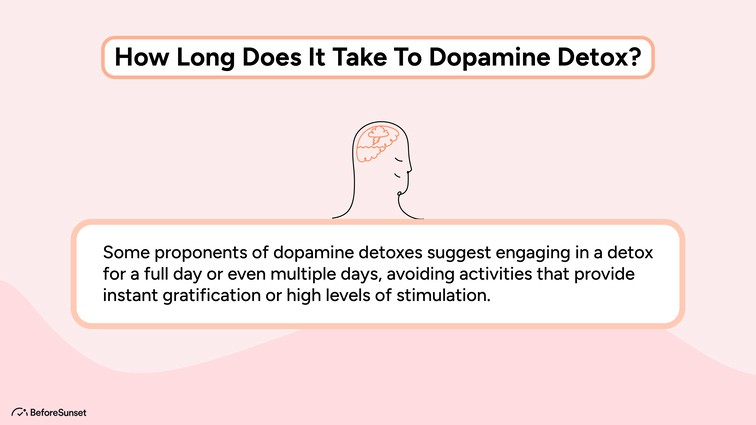
How Long Does a Dopamine Break Last?
The phrase "dopamine detox" usually refers to a time of self-imposed restraint from specific activities that could overexcite the brain's reward system, such as social media, video games, or excessive internet use. Resetting the brain's receptivity to dopamine, a chemical linked to pleasure and reward, is the aim.
The length of a dopamine detox might vary based on personal characteristics and the detox's particular objectives. While some individuals opt for shorter detox durations, like a day or a weekend, others could prefer longer intervals, like a week or even a month.
It's vital to remember that dopamine detoxification is not a notion that has been scientifically proven, and there is little data on its efficacy or the precise time frame needed for resetting dopamine sensitivity. The adaptability of the brain and how alterations in lifestyle affect dopamine receptors are complicated and can differ from person to person.
Setting time limits and goals that are appropriate for your unique requirements and situation is a smart idea if you're thinking about a dopamine detox. For individualized counsel and direction, speaking with a healthcare expert or therapist may be beneficial
What is Dopamine Withdrawal Like?
Dopamine withdrawal can be a challenging experience characterized by various effects on mood, behavior, and motivation. As the brain adjusts to reduced dopamine stimulation, individuals may encounter mood swings, irritability, restlessness, and even feelings of depression.
These emotional changes can make the withdrawal process emotionally taxing. Additionally, strong cravings and urges for the activities or substances that were previously providing excessive dopamine release may arise. These cravings can be intense and persistent, reminiscent of withdrawal symptoms experienced during substance dependency.
Furthermore, a temporary lack of motivation and difficulty concentrating may occur, as dopamine is closely involved in the brain's reward and motivation pathways. Overall, dopamine withdrawal can be a demanding process, but it's important to remember that individual experiences may vary.

How Long Does It Take to Rewire Dopamine?
Dopamine rewiring in the brain is a complicated process that varies greatly from person to person. There is no set period of time that can be universally applied since it relies on a number of variables, including the circumstances of each individual, the degree of dopamine dysregulation, and the particular techniques used to encourage rewiring.
Because of its neuroplasticity, the brain can change and restructure its connections, albeit it is unclear how long this process will take. A more major rewiring may take several months or longer, according to some research, while others show that neuroplastic alterations might happen very fast, within a matter of days or weeks.
Adopting better behaviors and partaking in activities that support balanced dopamine levels are frequent steps in the rewiring process. Regular exercise, exploring new hobbies, participating in mindfulness or meditation, keeping up with friends, and engaging in enjoyable and fulfilling activities are a few examples of these activities.
Remember that dopamine rewiring is a slow and continuing process. It takes persistent work and a dedication to making healthy lifestyle adjustments. A healthcare practitioner or professor of psychiatry can offer individualized direction and support during this journey.
How Often Should I Do Dopamine Detox?
There is no commonly accepted frequency for practicing dopamine detox, and the idea behind it is not supported by any scientific methodology. The frequency of a "dopamine detox" is ultimately determined by personal preferences, objectives, and demands.
To reset and restore their dopamine sensitivity, some people may decide to include periodic detox periods in their regimen. For instance, they may detox over the weekend once a month or take a week off from certain stimulating activities every few months. Others might discover that detoxing for a shorter amount of time—say, a day or two—more frequently has positive effects.
It's crucial to think about how pleasure chemical detox can affect your lifestyle and general well-being, as well as any potential advantages and disadvantages.
While for some people taking vacations from specific activities that could overstimulate the reward system might be helpful, it's equally crucial to concentrate on long-term development of a healthy and balanced way of life.
A sustained and balanced dopamine response may be facilitated by paying attention to your body, being aware of your behaviors, and generally leading a healthy lifestyle.
A healthcare expert or therapist can offer individualized assistance and support if you're unsure about how frequently you should do a dopamine detox or have worries about your dopamine-related unhealthy habits.
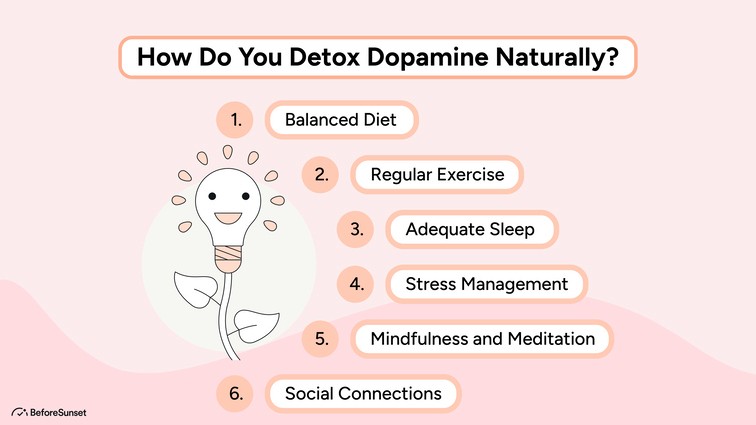
How Do You Detox Dopamine Naturally?
There are natural methods that can maintain a healthy dopamine balance, however the idea of "detoxing" dopamine is not supported by scientific research.
First and foremost, it's crucial to lessen overstimulating activities like social media, video games, and internet browsing. Setting limits and designating a particular period of time for these activities might be beneficial.
Incorporating physical activity into your routine is advantageous since it has been shown that regular aerobic exercise improves dopamine control and mood.
Additionally, mindfulness and meditation exercises can lower stress and improve general wellbeing. A healthy dopamine response can also be supported by prioritizing adequate sleep, eating a nutritious, well-balanced diet, and participating in enjoyable activities.
Remember, it's crucial to concentrate on permanent lifestyle decisions that support wellbeing rather than seeking for temporary "detox" fixes. If you are worried about your dopamine-related behaviors, talking to a therapist or healthcare provider can provide you tailored advice.
Is Dopamine Detox Good For Your ADHD?
There is no evidence that "dopamine detox" or "dopamine fasting" are effective therapies for attention deficit hyperactivity disorder. Impulsivity, hyperactivity, and inattention are symptoms of attention deficit hyperactivity disorder (ADHD).
Some neurotransmitters, particularly dopamine, may be abnormal in people with this condition.
Despite the possibility that excessive dopamine stimulation from activities such as video games or social media may aggravate symptoms in some persons, scientific studies do not support the concept of true dopamine detox as a stand-alone therapy for ADHD.
Due to the intricacy of the illness, treatment for attention deficit hyperactivity disorder (ADHD) is frequently extensive and specialized.
Evidence-based treatments for attention deficit hyperactivity disorder (ADHD) include medication, behavioral therapy, educational assistance, and changes to the patient's daily routine.
Methylphenidate and amphetamines, two regularly prescribed stimulants, boost focus, attention, and impulse control by altering dopamine production levels in the brain.
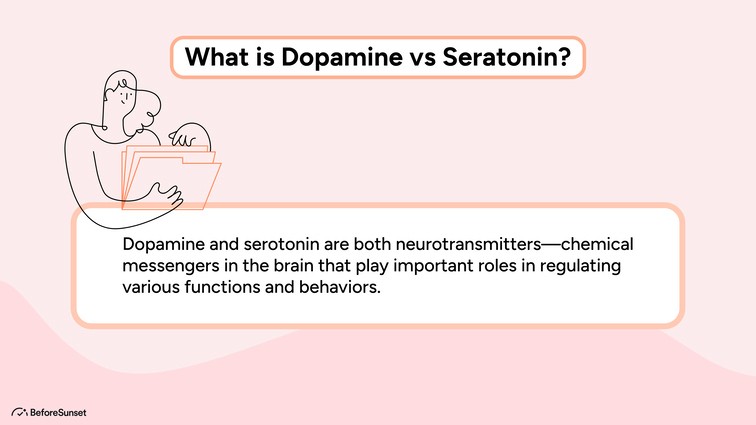
What is Dopamine vs Seratonin?
Both serotonin and dopamine are neurotransmitters, which are chemical messengers in the brain that are crucial for controlling a range of processes and actions.
The reward and pleasure circuits in the brain are frequently linked with dopamine. It plays a role in pleasure-seeking, behavioural reinforcement, bad habits and motivation. Movement, attention, learning, and mood modulation are other functions of dopamine.
Parkinson's disease, addiction, and other mental health conditions including schizophrenia have all been associated with levels of dopamine imbalances. These mental health issues can make it hard to preserve dopamine.
Contrarily, serotonin is frequently linked to mood management, emotional health, and general emotions of happiness and satisfaction. It aids with digestion, appetite, and sleep regulation. Additionally, serotonin affects social behavior, memory, and cognition.
Depression, anxiety disorders, and several eating disorders have all been linked to low serotonin levels.Despite having different roles, dopamine and serotonin interact intricately with one another and with other neurotransmitters to control a range of physiological and psychological processes.
Different illnesses can emerge as a result of imbalances or dysregulation in the dopamine or serotonin systems, which can also have an effect on general health.
Dopamine Detoxing and Remote Work: Balancing Mental Health
Remote work, especially prevalent in Silicon Valley, can significantly impact our mental health by altering the natural release of dopamine, a neurotransmitter that plays a crucial role in our reward system. The flexibility of working from home often blurs the line between professional and personal life, sometimes leading to the consumption of unhealthy foods or overuse of digital devices. These behaviors can cause a dopamine spike, offering temporary pleasure but potentially contributing to various mental health conditions.
Limited human contact in remote settings can exacerbate feelings of isolation, pushing individuals towards unhealthy habits or digital distractions for comfort. To combat this, incorporating digital detox periods—taking a break from activities that overstimulate the brain—can be beneficial. Engaging in regular everyday activities like exercise, eating well, and fostering social interactions helps reset the brain's reward system, promoting a healthier balance between work and life. This approach can help manage the dopamine system naturally, reducing the risks associated with substance use disorders and other related issues.
Harnessing Dopamine for Good: Building Healthier Habits in a World of Instant Gratification
Dopamine, that feel-good chemical in our brains, gets a lot of press. It's linked to everything from motivation to impulsive behavior. We crave activities that trigger dopamine release, which is why recreational drugs, bad habits like junk food, and even the constant stimulation of digital devices can be so hard to resist. But what if we could use this same system to build healthy habits?
The key is understanding that dopamine isn't just about instant gratification. It also plays a role in reward anticipation. When we consistently engage in healthy activities, our brains learn to associate them with a dopamine surge, not just during the activity itself, but also in the moments leading up to it. This creates a positive feedback loop, motivating us to repeat the behavior.
Here's how to leverage dopamine for positive change:
Start Small: Don't overwhelm yourself with a complete lifestyle overhaul. Begin with tiny habits that are easy to integrate into your everyday life. Maybe it's a 10-minute morning meditation session or a short walk during your lunch break.
Celebrate Progress: Every step forward counts! Recognize and reward yourself for sticking to your new routine. This reinforces the positive association with the activity and keeps you motivated.
Minimize Distractions: The constant dopamine hits from social media and other digital distractions can disrupt the formation of new, healthy habits. Consider a digital detox for specific periods of time to allow your brain to refocus on natural dopamine levels.
Break Bad Habits: Unhealthy behaviors like excessive junk food consumption and addictive activities can hijack your dopamine system, making it harder to stick to positive routines. Identify your negative habits and implement strategies to break them. This might involve setting boundaries, seeking support, or finding healthy replacements.
Quality Time: When building new habits, focus on activities that bring you a sense of quality time. This could be spending time in nature, learning a new skill, or connecting with loved ones. These activities not only provide a natural dopamine boost but also contribute to overall well-being.
Remember, creating lasting change takes time. There will be setbacks. But by understanding your brain's reward system, incorporating these tips, and paying attention to the amounts of dopamine released by different activities, you can harness the power of dopamine to build healthy habits that bring long-term benefits and quality time to your life.
Clinical experiences have shown that this approach can be effective in managing conditions like addiction and depression. If you find yourself struggling to break negative habits or implement healthy ones on your own, consider seeking professional guidance.
BeforeSunset AI: Harnessing Productivity for a Healthier You
In today's fast-paced world, achieving peak productivity often comes at a cost – our well-being. BeforeSunset AI steps in, offering a mindful productivity solution designed to empower you, not just get more done. Here's how BeforeSunset AI can help you cultivate healthy habits alongside boosting your productivity:
Time-blocking with Intention: BeforeSunset AI's time-blocking feature lets you schedule your tasks, but with a twist. Instead of just cramming everything in, you can use it to prioritize healthy habits. Block out dedicated time for exercise, meditation, or that healthy meal prep you've been meaning to do.
Track Your Wellbeing: BeforeSunset AI's time-tracking goes beyond just tasks. Track how much time you spend on activities that contribute to your overall well-being. Did you get that much-needed eight hours of sleep? Did you spend quality time with loved ones? Analyzing this data in the Personal Analytics section can give you valuable insights to adjust your schedule and prioritize healthy habits.
AI Assistant for a Healthier You: The BeforeSunset AI assistant isn't just about creating to-do lists. Leverage its power to automate healthy habits into your schedule. Want to go for a walk every afternoon? Set up a recurring task with a reminder. Need to take a meditation break in the middle of the workday? The AI assistant can help you schedule that too.
BeforeSunset AI empowers you to take control of your time and create a work-life balance that fosters healthy habits. By integrating these practices into your daily routine, you'll not only be more productive, but also feel your best. So ditch the burnout cycle and embrace a mindful approach to productivity with BeforeSunset AI.while


